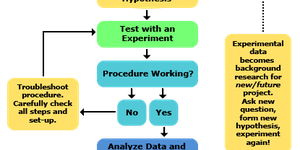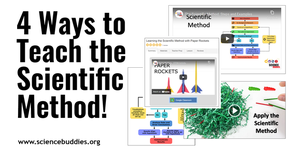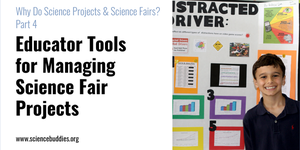The Scientific Method: Steps and Examples
Log In
Want to learn more? Check out these other resources:
Area of Science
You've seen for yourself, or in videos, planes flying, rockets hurdling towards space, boats racing through the water and submarines exploring the depths of the ocean. Have you ever stopped and thought about the aerodynamics and hydrodynamics involved in their operation? There is a lot of interesting science that goes into how they work!
Read more
Area of Science
How will we feed the world population by the year 2050? The United Nations projects that by 2050 the world population will have risen to 9.7 billion people—more than 2 billion more people than today! To feed everyone, we will need a lot more food, which makes agricultural technology incredibly important. Agricultural technology is the use of science, engineering, and technology to make agriculture (farming) better. This can mean a wide range of things, including preventing plant diseases,…
Read more
Area of Science
Astronomy is science that will challenge your imagination. How many stars in a galaxy? How many galaxies in the known universe? How many strange worlds are out there on other planets, orbiting other stars, and what are they like? Is there life on planets besides Earth? The distances are mind-boggling; the numbers are immense.
Read more
Area of Science
Yogurt, biofuel, biodegradable plastics, and antibiotics are all examples of products
based on biotechnology research and manufacturing techniques. What else will we be able to create as we use biotechnology in new ways?
Read more
Area of Science
From cell phones to social media, computer science is a part of your daily life. Everything from traffic lights to medical devices requires both computer hardware and software these days. Creative problem solvers are using computer science to tackle social problems, improve agriculture, make great entertainment, and start exciting new companies. What could you create and innovate with a bit of tinkering and programming?
Read more
Area of Science
Who doesn't love food? It's fun to make, it's fun to eat, it's fun to ...study? That's right! There is a lot of science that goes into the everyday foods that you love. Explore questions such as how baking ingredients work, how and why certain ingredients mix well together, and why people's tastes differ.
Read more
Area of Science
Humanity has faced pandemics since the beginning of time. The twentieth century saw multiple influenza pandemics, and now we are facing a COVID-19 pandemic caused by a coronavirus.
Coronaviruses are not new to humans or even to you. Coronaviruses are a family of viruses best identified by the crown-like spikes that cover their surface (corona is Latin for 'crown'). Coronaviruses cause upper-respiratory tract illnesses like the common cold and the 2003 SARS and 2012 MERS outbreaks. In the…
Read more
Area of Science
Cosmetic chemistry—thousands of personal care products line store shelves. From hair care and lotions to makeup and perfume, consumers have a wide range of choices. It takes science to develop and test products to improve them, offer new benefits, and ensure safety.
Learn more about the science involved in product development while making, testing, and comparing toiletry items in these hands-on science projects.
Read more
Area of Science
Personal messages, photos, banking information, credit card numbers, names, addresses, health records—a lot of
your family's private information is stored on computers and zipping through the Internet!
Cybersecurity is the act of keeping information, ranging from embarrassing baby photos to national secrets, private and viewed by only the right people.
Read more
Area of Science
If you have diabetes or know someone who does, you may be especially interested in doing a science project that explores a specific angle of diabetes. From the data you may be collecting with your continuous glucose monitor and carb counting to the ways in which factors like exercise affect blood glucose to technology and engineering related to diabetes tools and devices, there are all kinds of exciting projects you can explore.
Read more
Area of Science
As humans we are part of the environment. With over 7.5 billion of us on Earth, our combined actions also have a big impact on the environment. As long as we are aware of the impact, we can do things as individuals, and working together as groups, to lessen the detrimental impact of billions of people. Explore important topics like air quality, water quality, the effects of climate change, and many others to make informed decisions about caring for our planet.
Read more
Area of Science
Genetic engineering, also called gene editing or genetic modification, is the process of altering an organism's DNA in order to change a trait. This can mean changing a single base pair, adding or deleting a single gene, or changing an even larger strand of DNA. Using genetic engineering, genes from one organism can be added to the genome of a completely different species. It is even possible to experiment with synthesizing and inserting novel genes in the hopes of creating new traits.…
Read more
Area of Science
What traits are heritable? How different is your DNA from a frog's, a mouse's or even your relative's? Can your genes tell doctors what is the right dose of a medicine for your body? These are the types of questions scientists are answering with genetics and genomics. By studying individual genes as well as genomes, the whole set of DNA belonging to an organism, scientists hope to get a more complete understanding of how our bodies work and develop better disease treatments.
Read more
Area of Science
Geologists study the Earth, trying to understand the forces that gradually shape and change the landscape and ocean floor, as well as forces that make themselves felt more suddenly, like earthquakes and volcanoes. The information geologist discover helps in many ways, from keeping populations safe from disasters like landslides to uncovering important ore deposits like titanium used for surgical equipment.
Read more
Area of Science
If you're interested in learning more about how people think, what motivates them, how well their memories work, or any other of the fascinating things that make us human, then you're in the right place!
Read more
Area of Science
Isn't the human body incredible? From the complex systems that make it work to the numerous ways we're able to cure illnesses, there are so many fascinating subjects to study when it comes to human biology and health. Are you interested in subjects like how the body works, how best to keep it working, and how to cure everything from a common cough to cancer?
Read more
Area of Science
Do you love furry animals — studying them or even playing with them? Maybe you wonder why your pet loves that certain ball, or shakes hands with one paw more than the other. Or maybe you are curious about how bats navigate through the dark. Then you're sure to enjoy learning about mammalian biology with your pet or other friendly animals you know!
Read more
Area of Science
You already know that medicines like antibiotics and aspirin can make you feel better when you are sick, but how do researchers find new medicines? Do medications work the same way for everyone? How can we use medicine to treat genetic diseases?
Read more
Area of Science
Microorganisms are all around us, with an amazing diversity of adaptations. They were the first life on Earth, and their relatively recent discovery in extreme environments—like hot springs, ocean vents, and polar ice—illustrates how tenaciously they've evolved and survived. Microbiology gives us insights into evolution, disease, and even the mechanisms of our own cells.
Read more
Area of Science
About 70% of Earth's surface is covered by oceans but humans have only explored 5% of the ocean! From microscopic phytoplankton to pods of whales and global weather patterns there is a lot left to discover.
Read more
Area of Science
Photography utilizes many different technologies to produce the pictures and videos we've come to take for granted: optics, electronics, mathematics, computer science, materials science, and mechanical engineering, to name a few.
Read more
Area of Science
Wikipedia defines mathematics as "the study of quantity, structure, space and change." With a definition like that, it's easy to see why math is often called "the language of science." Math is essential for analyzing and communicating scientific results, and for stating scientific theories in a way that is clear, succinct, and testable.
Read more
Area of Science
Top athletes and coaches use a whole lot of science and engineering to improve performance and increase the chances of winning. Technologies like better tennis rackets, sleeker running and swimming outfits, and aerodynamic soccer balls, mean that current athletes are breaking world records left and right. Add to that better nutrition and science-based training regimes and you have an era of amazing athletes! Explore how science and engineering impact your favorite sport.
Read more
Area of Science
You already know that playing video games is fun, but so is making them, and that takes a lot of science! Try your hand at making your own video games, or explore how video games impact how people think, remember, and move.
Read more
Area of Science
Exploring virtual reality makes for a fun science or engineering project! Making virtual reality (VR) accessible to the public requires lots of different people to work together. Neurobiologists investigate the vision and hearing tricks that make virtual reality possible. Engineers develop virtual reality hardware and software. Animators, video editors, and other technical artists create virtual reality content. You can explore all of these aspects of virtual reality with the resources on this…
Read more
Area of Science
Everybody talks about the weather, but nobody does anything about it.
- Charles Dudley Warner
Weather and atmospheric science offer lots of opportunities for interesting explorations. It's a satisfyingly complex area, with lots of online resources so you can make your project as easy or as advanced as you want. And when you're done, you'll have a science fair project everyone can talk about.
Read more
Area of Science
"Big data" is exactly what it sounds like, a really large amount of data. Science has always been at the forefront of gathering, visualizing, and trying to make sense of massive data sets. For example, think of the more than 661,000 (and counting) asteroids that have been discovered in our solar system. Or ponder that 1.2 million species have been caught, identified, classified, and catalogued on Earth. And then there are the approximately 3 billion base pairs sequenced from the human genome.…
Read more
Project Resource
What is the Scientific Method?
The scientific method is a process for experimentation that is used to explore observations and answer questions.
Do all scientists follow the scientific method exactly?
No. Some areas of science can be more easily tested than others.
For example, scientists studying how stars change as they age or how dinosaurs digested their food cannot fast-forward a star's life by a million years or run medical exams on feeding dinosaurs to test their hypotheses.…
Read more
Blog Post
Teaching students about the scientific method helps prepare them to do science experiments and to design and execute their own science fair projects to explore science questions. These four free plug-and-play resources help you approach the scientific method with tools and learning aids that suit the needs of your classroom.
Teaching Steps of the Scientific Method
Whether preparing students to do classroom science experiments and science fair projects…
Read more
Blog Post
Find tools to help streamline assigning, managing, and assessing student science projects. We also have resources to help you plan your science fair! This is part 4 in our STEM education series on the value of science projects and science fairs.
Are you feeling overwhelmed by the thought of assigning science fair projects? We can help!
Science Buddies has a number of free tools for educators to help manage the student science fair project, from start…
Read more
Explore Our Science Videos
The Ambiguous Cylinder Illusion
Solubility Science – STEM Activity
The Science of Frescoes – STEM Activity








